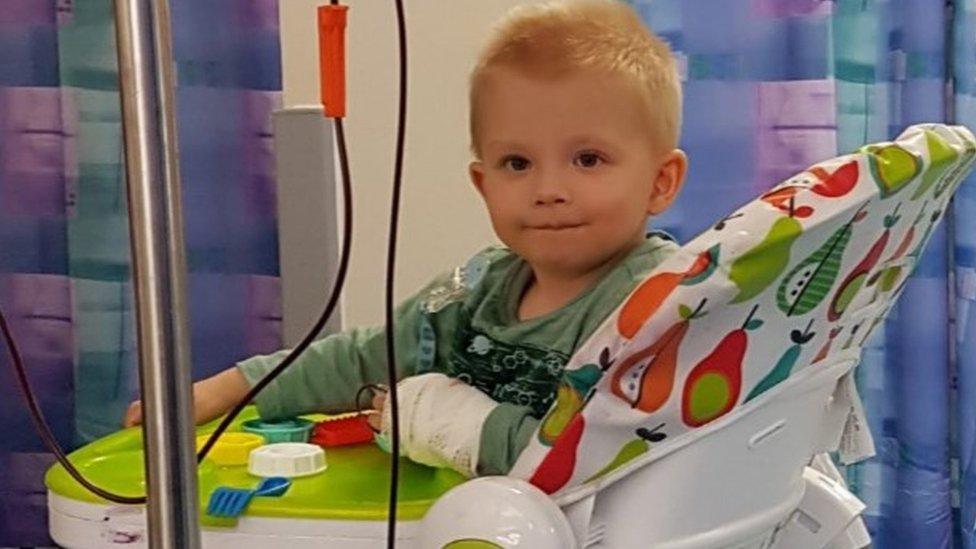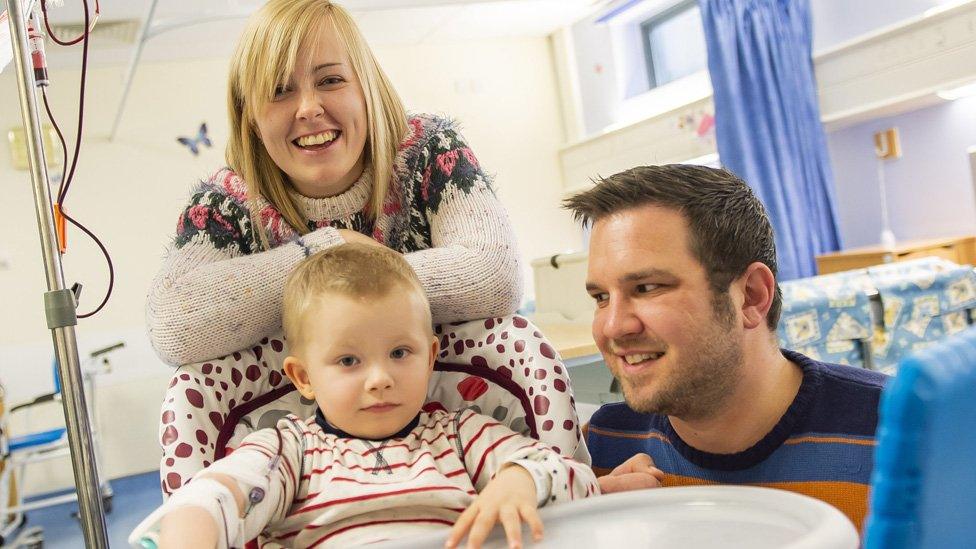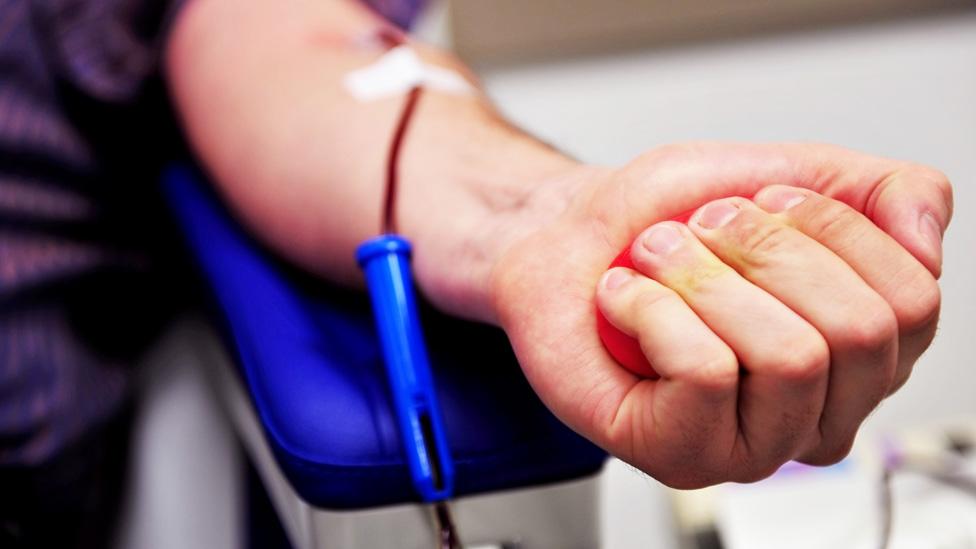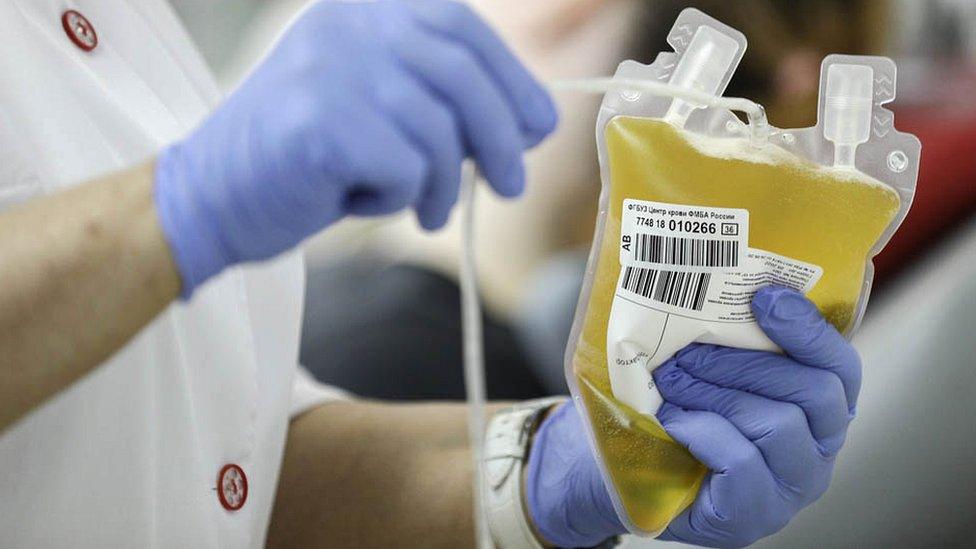Giving blood: 'We are reliant on blood donors to keep Henry alive'
- Published

Since his birth, Henry Alderson, two, has relied on blood donors to keep him alive
Every blood donation "can save up to three lives", yet come December thousands miss vital appointments to give blood, as the festivities kick in.
It can make a huge difference to patients like two-year-old Henry Alderson who needs blood transfusions every two weeks.
Last year, more than 9,000 people cancelled donor appointments at short notice in the week before Christmas.
When donors drop out in such numbers, bloods stocks inevitably dwindle.
For Henry, from Harwich, Essex, it could mean the difference between a Christmas spent waiting up for Rudolph and crashing his toys into the tree - and a Christmas spent in bed.
He has a rare condition called Diamond-Blackfan anaemia. It means he can't make his own red blood cells and needs blood transfusions every four weeks to keep him alive.
His mum Zoe said: "Transfusions are absolutely critical for Henry. We are reliant on blood donors... just to keep him alive."
In the days before each blood transplant, Henry's energy levels "plummet" according to his mum.
"When he gets this magical transfusion of blood, he's transformed into a healthy little boy," his mum says.

Henry, pictured with his mum and dad, requires regular blood transfusions
"For Henry - and people like him - it's being able to celebrate their birthday [next week], it's giving us the opportunity to tuck into bed on Christmas Eve and watch him wake up on Christmas morning. It's the gift of life."
"If you can donate blood, please, please do."
Mike Stredder, director of blood donation for NHS Blood and Transplant., said: "Demand for lifesaving blood doesn't stop for Christmas. We need our loyal donors more than ever at this time of year."
Missed appointments rise in the middle of December, as people's diaries fill up with parties and shopping excursions.
The cold weather can also put people off going out.
In the worst pre-Christmas period last year, one in 10 people couldn't even be bothered to cancel and just failed to turn up for their appointment altogether.
And this year, amid fears of a predicted cold spell - from the end of November to the second week of December, the situation could be worse than ever.
Should we pay people for donating blood?

Transfusions are typically used to treat a blood condition or cancer or due to surgery, childbirth or an accident
NHS Blood and Transplant needs to collect 1.4 million units of blood each year to meet the needs of patients across England.
And autumn donations were also unexpectedly low this year, further fuelling fears over a Christmas shortage.
New donors will take too long to process in the run-up to Christmas, meaning blood banks will be dependent upon those already registered.
So the NHS Blood and Transplant are calling on regular donors to make an appointment - and keep it.
Donors who need to cancel are being asked to give at least three days' notice so the slot can be given to someone else.
"Please keep your appointment to give blood," says Mr Stredder.
"We need... to make sure hospitals have the blood that seriously ill children and adults will need over Christmas and the new year."

How do you register for blood donation?
You can register to give blood at www.blood.co.uk (in England), www.welsh-blood.org.uk (in Wales), www.scotblood.co.uk (in Scotland) and nibts.hscni.net (in Northern Ireland)
New donors must be aged between 17 and 66 and weigh at least 50kg (7st 12lb)
Anyone who has had a blood transfusion since January 1980 cannot give blood, to safeguard against the possible risk of variant CJD being passed from donor to patient
Pregnant women cannot donate blood
Those undergoing infertility treatment may also be advised against it
Those who are unwell are advised to wait until any illness has passed
Most cancer patients will also be unable to give blood
Travel to certain countries may also disqualify a donor from giving blood

- Published15 November 2018
